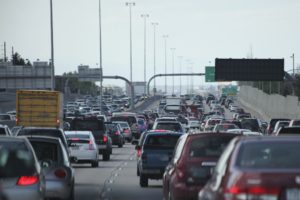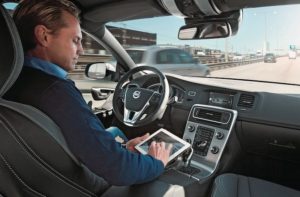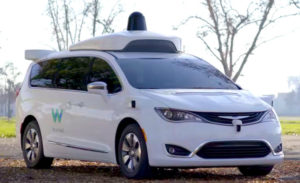Self-Driving Car Legislation in Colorado Moves To Senate
 More than 5 months ago the State of Colorado made history with the debut of the first self-driving tractor trailer test drive in the U.S. The test paired up infamous beer produce Budweiser with Uber Technologies. The tractor trailer was packed with 50,000 beers and drove successfully from Fort Collins, CO to Colorado Springs, CO a trip that encompassed over 120 miles. The journey was accompanied by the Highway Patrol and encountered no problems.
More than 5 months ago the State of Colorado made history with the debut of the first self-driving tractor trailer test drive in the U.S. The test paired up infamous beer produce Budweiser with Uber Technologies. The tractor trailer was packed with 50,000 beers and drove successfully from Fort Collins, CO to Colorado Springs, CO a trip that encompassed over 120 miles. The journey was accompanied by the Highway Patrol and encountered no problems.
Technology is changing rapidly and currently there are no laws on the books in Colorado that address self-driving vehicles. The self-driving car is being created from the ground up as we speak. We potentially are on the brink of technology that will radically change the way we all live in the future.
Currently 14 states have legislation on the books with Nevada, California, Michigan and Arizona being the most prominent testing grounds for self-driving technology. Although every state in the nation has introduced proposals for autonomous vehicle legislation, few have enacted anything permanent. California has the strictest laws regarding self-driving vehicles. The state requires that companies publicly report crashes and disengagements, where the human driver takes over from the auto-pilot. Recently the state has proposed new legislation to finally move self-driving vehicles from testing to actual reality.
California is the hotbed of the self-driving cars with 27 companies all testing prototypes. The law also states that self-driving cars must be accompanied but a human driver behind the wheel at all times. This technology is a potential game changer. In addition to curbing traffic jams, it could save lives. There are approximately 3000 deaths per year in California due to traffic accidents; 90% are caused by human error. The technology has high hopes by making people more mobile, curbing gas and diesel emissions and boost the economy.
On Thursday, the Colorado Senate Transportation Committee heard testimony from people for and against Senate Bill 17-213. The bill was sponsored by Owen Hill and Dominick Moreno which outlines the framework to allow autonomous vehicles on Colorado roads as long as they obey state and federal laws. If the vehicles do not meet state and federal laws companies must coordinate with CDOT and the State Patrol to do any sort of testing on public roads. Overall the level of optimism for the technology is high across the board. The US Department of Transportation is supporting the technology and announced plans for a nationwide software system called RoadX to curb congestion issues, reduce crashes and solve growth issues in cities and on highways. The aim is to have one software network that all companies can use. Every vehicle, regardless of manufacturer, would all be connected using the same maps and traffic data. Self-driving cars currently use GPS, lasers, sensors and cameras to determine traffic and road conditions.
Overall the level of optimism for the technology is high across the board. The US Department of Transportation is supporting the technology and announced plans for a nationwide software system called RoadX to curb congestion issues, reduce crashes and solve growth issues in cities and on highways. The aim is to have one software network that all companies can use. Every vehicle, regardless of manufacturer, would all be connected using the same maps and traffic data. Self-driving cars currently use GPS, lasers, sensors and cameras to determine traffic and road conditions.
Those who spoke against the bill included Charles Perko of EVRAZ Rocky Mountain Steel of Pueblo. He stated he once witnessed a colleague get serious injured in an accident involving a self-operated machine. He worries that accidents could increase if the technology continues to expand in the industrial and transportation sector. Kiersten Forseth, of the Colorado AFL-CIO represented commercial drivers, primarily over-the-road truckers. She was in favor of the technology and largely said the transportation industry is behind automation however she was worried about not having a “fail-safe” solution such as an experienced driver behind the wheel at all times.
Many others spoke about the future benefits such as Nathan Weathers of the Colorado Farm Bureau. He stated that he began using auto-pilot technology in 1998 on his tractor and never looked back. The auto-pilot features reduce fatigue and increases efficiently on large farms. Others, such as the Advocacy Denver, stated that the technology would help those with disabilities become much more independent. Hal Lenox of General Motors Company attended the meeting on behalf of the company. He stated that according to the National Highway Traffic Safety Administration 94% of all traffic accidents in 2015 were the result of human error and that this technology would decrease accidents dramatically with both gas powered vehicles as well as over the road diesel engine vehicles. Mr. Lenox also spoke about how the law needs to change in Colorado for GM to explore further self-driving vehicle possibilities in Colorado. Currently all of the laws on the book are catered to human drivers behind the wheel.
Hal Lenox of General Motors Company attended the meeting on behalf of the company. He stated that according to the National Highway Traffic Safety Administration 94% of all traffic accidents in 2015 were the result of human error and that this technology would decrease accidents dramatically with both gas powered vehicles as well as over the road diesel engine vehicles. Mr. Lenox also spoke about how the law needs to change in Colorado for GM to explore further self-driving vehicle possibilities in Colorado. Currently all of the laws on the book are catered to human drivers behind the wheel.
A motion for an amendment to require a human backup driver in vehicles was recommended by Senator Nancy Todd but was ultimately rejected. The debate going forward is whether or not a “backup driver” will be required for testing purposes. Those who voted against the amendment stated that adding too many regulations at the beginning is not a good way to help this industry grow.
Senate Bill 17-213 passed with a 5-0 vote and will move on to a full hearing in the State Senate. Time will tell what the future may hold for the advent of self-driving technology in Colorado but it looks like things are moving in the right direction.




